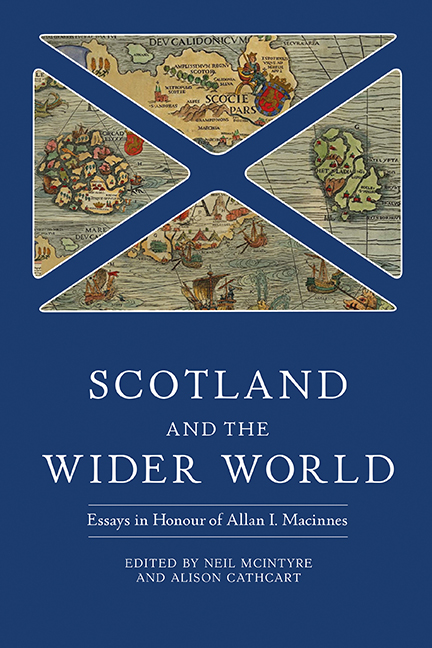Book contents
- Frontmatter
- Contents
- List of Contributors
- Preface
- List of Abbreviations
- 1 Covenants, Clans and Unions in Context: Celebrating the Scholarship of Allan I. Macinnes
- Part I Peoples and Cultures in Britain and Ireland
- Part II War, Religion and the House of Stuart
- Part III Union, Empire and Enlightenment
- List of Publications
- Index
- Tabula Gratulatoria
- Studies in Early Modern Cultural, Political and Social History
7 - Alexander Shields (c. 1660–1700) on the Right of Punitive Arms
Published online by Cambridge University Press: 26 May 2022
- Frontmatter
- Contents
- List of Contributors
- Preface
- List of Abbreviations
- 1 Covenants, Clans and Unions in Context: Celebrating the Scholarship of Allan I. Macinnes
- Part I Peoples and Cultures in Britain and Ireland
- Part II War, Religion and the House of Stuart
- Part III Union, Empire and Enlightenment
- List of Publications
- Index
- Tabula Gratulatoria
- Studies in Early Modern Cultural, Political and Social History
Summary
The purpose of this essay is to explore a major ideological shift performed by the preacher and polemicist Alexander Shields in his epic 700-page tome A Hind Let Loose, or, An Historical Representation of the Testimonies of the Church of Scotland, first printed in the Netherlands in 1687 and republished at Edinburgh in 1744 and Glasgow in 1770 and 1797. In this work Shields made a significant contribution to the shape of dissenting Presbyterian political thought in Scotland, Ireland, and the United States in the eighteenth century.
The subject engages with Macinnes's scholarship on two levels. It represents, first, a nod towards his unfulfilled undergraduate desire to study Shields at doctoral level. At our meetings Macinnes lamented how his own doctoral supervisors, Ian Cowan and Archie Duncan, had persuaded him to concentrate on the emergence of the Covenanting movement rather than the maintenance of the cause after the Restoration. While scholars may be curious to know how his own study might have played out, they are surely grateful for the research trajectory he pursued. Second, the essay picks up an idea first proffered in his essay on Covenanting ideology in the seventeenth century. Here Macinnes argued that the Covenanting movement was in fact two movements: a movement of power, from 1638; and a movement of protest, from 1660. This is perhaps an over-simplification of a far messier reality on the ground, but it remains the case that we know relatively little about the process by which Covenanting ideology shifted from underwriting the existence of a revolutionary regime to that of an atomised pressure group. Of course, the complexity of this shift cannot reasonably be covered here, so the essay will therefore focus specifically on the justification of what Shields termed ‘punitive force’; that is, the move by radical Presbyterian dissenters from defence to offence. It is argued here that this shift reflected the politics of religion at the local level in the Restoration period, providing a theoretical framework which vindicated violence resistance in the 1680s and the campaigning of future generations of dissidents seeking to imitate their ‘renowned Ancestors’.
Shields was born at Haughhead near Earlston, Berwickshire, in 1659 or 1660 to the tenant farmer James Shields.
- Type
- Chapter
- Information
- Scotland and the Wider WorldEssays in Honour of Allan I. Macinnes, pp. 99 - 115Publisher: Boydell & BrewerPrint publication year: 2022

